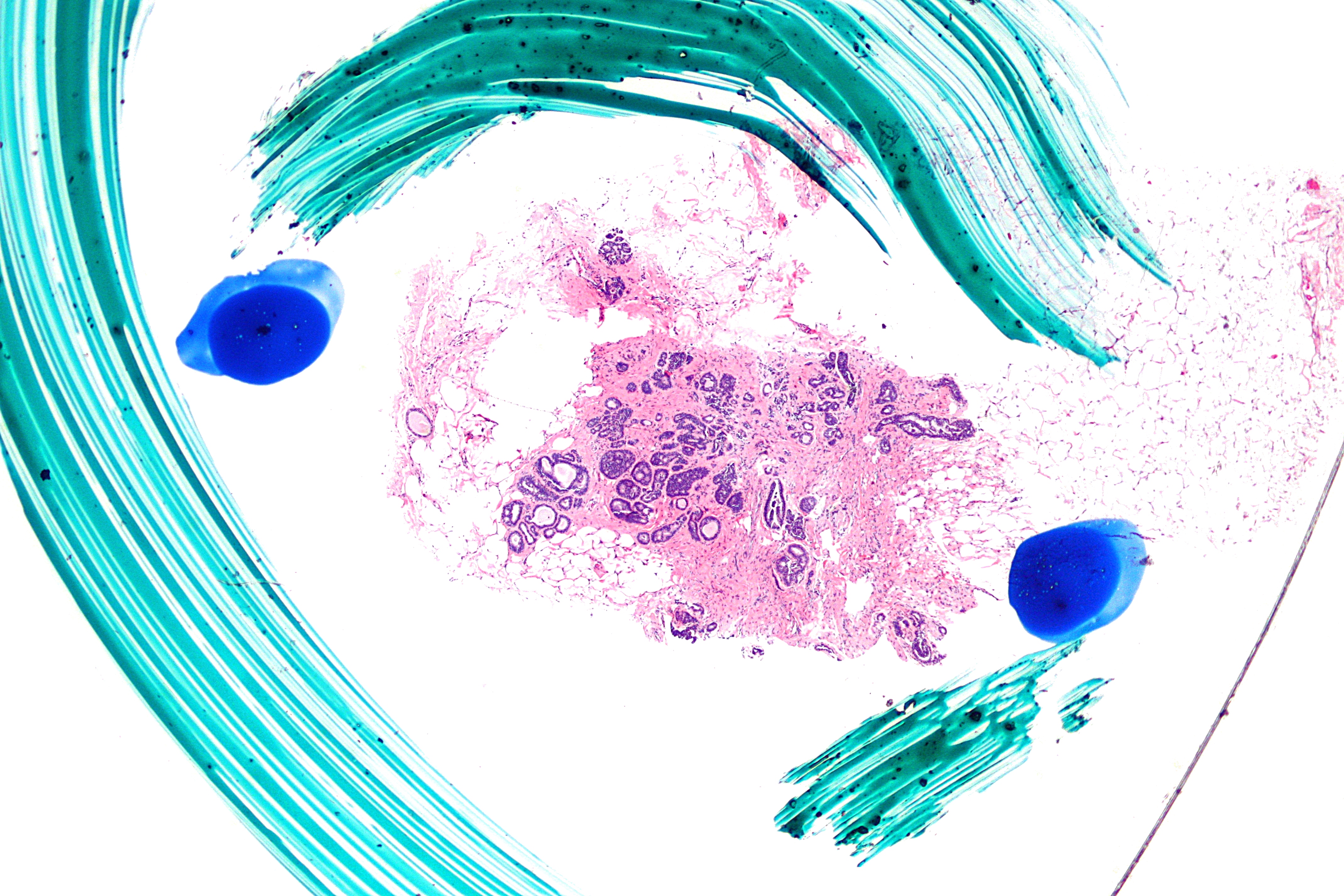Atypical ductal hyperplasia

Editor-In-Chief: Prab R Tumpati, MD
Obesity, Sleep & Internal medicine
Founder, WikiMD Wellnesspedia &
W8MD's medical weight loss NYC, sleep center NYC
Philadelphia medical weight loss and Philadelphia sleep clinics
| Atypical ductal hyperplasia | |
|---|---|

| |
| Synonyms | ADH |
| Pronounce | N/A |
| Specialty | N/A |
| Symptoms | Often asymptomatic, may be detected on mammography |
| Complications | Increased risk of breast cancer |
| Onset | Typically diagnosed in women aged 40-60 |
| Duration | Chronic |
| Types | N/A |
| Causes | Abnormal proliferation of ductal epithelial cells |
| Risks | Family history of breast cancer, hormone replacement therapy |
| Diagnosis | Biopsy, histopathology |
| Differential diagnosis | Ductal carcinoma in situ, usual ductal hyperplasia |
| Prevention | Regular mammograms, lifestyle modifications |
| Treatment | Surveillance, surgical excision |
| Medication | Tamoxifen or other selective estrogen receptor modulators |
| Prognosis | Good with monitoring, but increased risk of breast cancer |
| Frequency | Found in approximately 5-10% of breast biopsies |
| Deaths | N/A |



Atypical Ductal Hyperplasia (ADH) is a condition characterized by the abnormal proliferation of cells within the milk ducts of the breast. It is considered a precancerous condition, meaning that while it is not cancer, it has the potential to develop into a more serious form of breast cancer if left untreated. ADH is often discovered during a mammogram as part of routine breast cancer screening or following an investigation of a breast lump.
Diagnosis[edit]
The diagnosis of ADH is typically made through a combination of imaging tests and a biopsy. Imaging tests, such as a mammogram or ultrasound, can identify areas of abnormal tissue in the breast. However, a definitive diagnosis requires a biopsy, where a small sample of breast tissue is removed and examined under a microscope by a pathologist. The presence of atypical cells that have not spread outside the ducts characterizes ADH.
Risk Factors[edit]
Several risk factors are associated with the development of ADH, including age, family history of breast cancer, personal history of breast lesions, and certain genetic mutations. Women with ADH have an increased risk of developing breast cancer in the future, making it important to identify and monitor this condition early.
Treatment and Management[edit]
The treatment for ADH often involves surgical removal of the affected tissue, typically through a procedure known as a lumpectomy. In some cases, particularly when ADH is found alongside other high-risk conditions, more extensive surgery may be recommended. Following surgery, patients are usually advised to undergo regular breast cancer screening to monitor for the development of invasive cancer.
Prognosis[edit]
While ADH itself is not cancer, it indicates an increased risk of developing breast cancer in the future. With appropriate treatment and monitoring, the prognosis for individuals with ADH is generally good. Early detection and management of ADH are crucial for preventing the progression to more serious forms of breast cancer.
See Also[edit]
Ad. Transform your life with W8MD's Budget GLP-1 injections from $75


W8MD offers a medical weight loss program to lose weight in Philadelphia. Our physician-supervised medical weight loss provides:
- Weight loss injections in NYC (generic and brand names):
- Zepbound / Mounjaro, Wegovy / Ozempic, Saxenda
- Most insurances accepted or discounted self-pay rates. We will obtain insurance prior authorizations if needed.
- Generic GLP1 weight loss injections from $75 for the starting dose.
- Also offer prescription weight loss medications including Phentermine, Qsymia, Diethylpropion, Contrave etc.
NYC weight loss doctor appointmentsNYC weight loss doctor appointments
Start your NYC weight loss journey today at our NYC medical weight loss and Philadelphia medical weight loss clinics.
- Call 718-946-5500 to lose weight in NYC or for medical weight loss in Philadelphia 215-676-2334.
- Tags:NYC medical weight loss, Philadelphia lose weight Zepbound NYC, Budget GLP1 weight loss injections, Wegovy Philadelphia, Wegovy NYC, Philadelphia medical weight loss, Brookly weight loss and Wegovy NYC
|
WikiMD's Wellness Encyclopedia |
| Let Food Be Thy Medicine Medicine Thy Food - Hippocrates |
Medical Disclaimer: WikiMD is not a substitute for professional medical advice. The information on WikiMD is provided as an information resource only, may be incorrect, outdated or misleading, and is not to be used or relied on for any diagnostic or treatment purposes. Please consult your health care provider before making any healthcare decisions or for guidance about a specific medical condition. WikiMD expressly disclaims responsibility, and shall have no liability, for any damages, loss, injury, or liability whatsoever suffered as a result of your reliance on the information contained in this site. By visiting this site you agree to the foregoing terms and conditions, which may from time to time be changed or supplemented by WikiMD. If you do not agree to the foregoing terms and conditions, you should not enter or use this site. See full disclaimer.
Credits:Most images are courtesy of Wikimedia commons, and templates, categories Wikipedia, licensed under CC BY SA or similar.
Translate this page: - East Asian
中文,
日本,
한국어,
South Asian
हिन्दी,
தமிழ்,
తెలుగు,
Urdu,
ಕನ್ನಡ,
Southeast Asian
Indonesian,
Vietnamese,
Thai,
မြန်မာဘာသာ,
বাংলা
European
español,
Deutsch,
français,
Greek,
português do Brasil,
polski,
română,
русский,
Nederlands,
norsk,
svenska,
suomi,
Italian
Middle Eastern & African
عربى,
Turkish,
Persian,
Hebrew,
Afrikaans,
isiZulu,
Kiswahili,
Other
Bulgarian,
Hungarian,
Czech,
Swedish,
മലയാളം,
मराठी,
ਪੰਜਾਬੀ,
ગુજરાતી,
Portuguese,
Ukrainian
